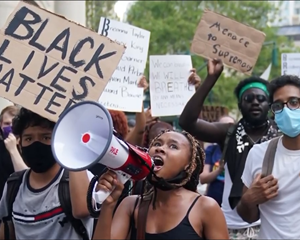JUDY WOODRUFF: Both presidential candidates agree this is the most important election in modern history. But in most recent elections, about four in 10 eligible voters stayed home. We talked to a few of the people who are not voting this time around.
CLIFFORD GENECE, Not Voting in 2020: My name is Clifford Genece. I'm from Brooklyn, New York, currently residing in Denver, Colorado.
ELLIE PANA, Not Voting in 2020: Hi. I'm Ellie Pana. I am a Greek American dual citizen born and raised in America, but living in Greece now.
RODGER WEIR, Not Voting in 2020: My name is Rodger Weir.
MARYAM ALANIZ, Not Voting in 2020: My name is Maryam Alaniz. I'm not voting in this election.
ELLIE PANA: I would have never thought that I would not be voting or would even consider not voting. I never -- like, I have always -- like, it's my civic duty or it's my patriotic duty or even my desire. Like, I want to do it.
CLIFFORD GENECE: This year is the first year where I just don't feel like -- I don't feel represented or heard.
RODGER WEIR: I'm not voting because no one has earned it. No one has earned my vote. If I can't have a candidate that I feel is going to actually represent me, then why should I vote?
CLIFFORD GENECE: I don't feel like anyone is doing anything that's really going to create change and kind of bring us back to a place where we're not having these continual tensions and issues that we have been having for centuries.

MARYAM ALANIZ: If there was a candidate that spoke to my concerns, spoke to my interests, shared my politics, Then maybe I would consider voting.
ELLIE PANA: Because I am overseas and I waited too late in the game for an absentee ballot, then it's like, OK, should I get on a plane, fly to New York for a couple days, cast my ballot, and then come back? And because neither candidate inspires me that much, I'm like, I will just sit this one out.
RODGER WEIR: If we live in the land of the free, the home of the brave, and we have freedom to choose, then give me that freedom, give me the choice, instead of just giving me these two steaming piles of waste on which to decide from.
MARYAM ALANIZ: This past year, there -- it's been a really, really volatile year. A lot of countries are facing political crises. And, really, it's a lot of young people like myself who are really, really dissatisfied and are realizing that, like, voting is not the only way to make our voices heard. If we want to actually organize ourselves, like, we shouldn't cede electoralism as our only option. We should be empowered to go to the streets.
CLIFFORD GENECE: I understand that there is power and there is a necessity in voting. But if I know that voting has no impact on what I want for change, then it isn't an altruistic act. It's just -- it's just doing it, again, just to do it. I think not voting and not participating sends more of a message to leaders that we're not happy. We're not happy with what's going on.













